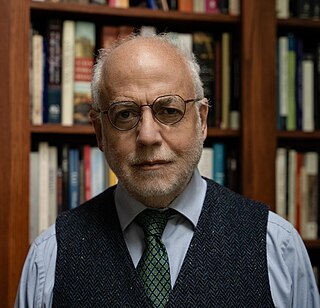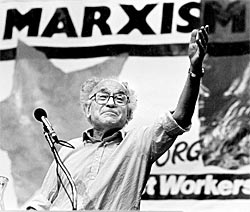
Trotskyism is the political ideology and branch of Marxism developed by Russian revolutionary and intellectual Leon Trotsky along with some other members of the Left Opposition and the Fourth International. Trotsky described himself as an orthodox Marxist, a revolutionary Marxist, and a Bolshevik–Leninist as well as a follower of Karl Marx, Frederick Engels, Vladimir Lenin, Karl Liebknecht, and Rosa Luxemburg.

The Fourth International (FI) was a political international established in France in 1938 by Leon Trotsky and his supporters, having been expelled from the Soviet Union and the Communist International.

Homero Rómulo Cristalli Frasnelli, better known under the pseudonym J. Posadas or sometimes Juan Posadas, was an Argentine Trotskyist whose personal vision is usually described as Posadism. Originally a collective pen name of the leadership of the Grupo Cuarta Internacional in Argentina in the 1940s, it was also used by Dante Minazzoli initially.

The Fourth International Posadist is a Trotskyist international organisation. It was founded in 1962 by J. Posadas, who had been the leader of the Latin America Bureau of the Fourth International in the 1950s, and of the Fourth International's section in Argentina. Between their split from the International Secretariat of the Fourth International in 1962 and Posadas' death in 1981, Posadists developed a strain of communism that included several fringe ideas, which brought them into conflict with more mainstream left-wing groups.
The Revolutionary Socialist League (RSL) was a Trotskyist group in the United States established in 1973 and disbanded in 1989.
Raya Dunayevskaya, later Rae Spiegel, also known by the pseudonym Freddie Forest, was the American founder of the philosophy of Marxist humanism in the United States. At one time Leon Trotsky's secretary, she later split with him and ultimately founded the organization News and Letters Committees and was its leader until her death.
The Spartacist League is a Trotskyist political grouping which is the United States section of the International Communist League, formerly the International Spartacist Tendency. This Spartacist League named themselves after the original Spartacus League of Weimar Republic in Germany, but has no formal descent from it. The League self-identifies as a "revolutionary communist" organization.

David North is an American Marxist, who has been active in the international Trotskyist movement since 1971. He is currently the National Chairman of the Socialist Equality Party in the United States (SEP), formerly the Workers League. He served as the National Secretary of the SEP until the party's congress in 2008.
The International Committee of the Fourth International (ICFI) is a public faction of the Fourth International founded in 1953. Today two Trotskyist internationals claim to be the continuations of the ICFI; one with sections named Socialist Equality Party which publishes the World Socialist Web Site, and another linked to the Workers Revolutionary Party in the UK.

The Socialist Equality Party (SEP) is a Trotskyist political party in the United States, one of several Socialist Equality parties around the world affiliated with the International Committee of the Fourth International (ICFI). The ICFI publishes daily news articles, perspectives and commentaries on the World Socialist Web Site and maintains Mehring Books as publishing house.

The Fourth International (FI), founded in 1938, is a Trotskyist international. In 1963, following a ten-year schism, the majorities of the two public factions of the Fourth International, the International Secretariat (ISFI) and the International Committee (ICFI), reunited, electing a United Secretariat of the Fourth International.
The third camp, also known as third camp socialism or third camp Trotskyism, is a branch of socialism that aims to oppose both capitalism and Stalinism by supporting the organised working class as a "third camp".

The Socialist Workers Party (SWP) is a far-left political party in the United Kingdom. Founded as the Socialist Review Group by supporters of Tony Cliff in 1950, it became the International Socialists in 1962 and the SWP in 1977. The party considers itself to be Trotskyist. Cliff and his followers criticised the Soviet Union and its satellites, calling them state capitalist rather than socialist countries.
Michel Pablo was the pseudonym of Michalis N. Raptis, a Trotskyist leader of Greek origin.
Workers' Power is a Trotskyist group which forms the British section of the League for the Fifth International. The group publishes the newspaper Workers Power and distributes the English-language journal Fifth International.

Tony Cliff was a Trotskyist activist. Born to a Jewish family in Ottoman Palestine, he moved to Britain in 1947 and by the end of the 1950s had assumed the pen name of Tony Cliff. A founding member of the Socialist Review Group, which became the International Socialists and then the Socialist Workers Party, in 1977. Cliff was effectively the leader of all three.

The Socialist Workers Party (SWP) is a communist party in the United States. The SWP began as a group which, because it supported Leon Trotsky over Soviet leader Joseph Stalin, was expelled from the Communist Party USA. Since the 1930s, it has published The Militant as a weekly newspaper. It also maintains Pathfinder Press.

The International Socialist Tendency (IST) is an international grouping of unorthodox Trotskyist organisations espousing the ideas of Tony Cliff (1917–2000), founder of the Socialist Workers Party (SWP) in Britain. IST supporters are sometimes called "Cliffites". It has sections across 27 countries; however, its strongest presence is in Europe, especially in Britain.








